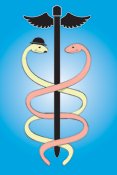Wednesday, December 31, 2008
During a recent visit to the East Coast with friends, I began to have painful stomach cramps. My friend offered me a therapeutic hot-water bottle, which I placed on my mid-section as I lay on the couch. Just as the muscle pains began to subside, I felt a sudden sharp pain on my right thigh. I glanced down and shrieked when I saw the bottle leaking boiling water through my pants and onto my skin. I jumped up, made a run for the shower and sprayed cold water onto the second-degree burn that had already begun to blister.
I normally would lose my cool in this type of situation, chastising myself for my carelessness. This time, however, I was able to laugh at the ridiculousness of the situation even as it was happening. From behind the bathroom door, I assured my friends that I was all right by quoting a scene from the film "Austin Powers": "I'm very badly burned. I'm in quite a lot of pain." I put an ice pack into my pajama pants and cracked jokes about the conspicuous bulge that left wet patches as it melted.
From this experience I learned the following lessons: First, be careful with home remedies that may cause an injury instead of healing one. Second, always be thankful things aren't worse. And third, laughter really is the best medicine.
Not only did laughing help me through a painful situation, but I believe it aided the healing process. The burns have since healed into a couple of smooth, pink scars that will fade with time.
The power of laughter to manage overall physical health, stress level and mood are well-documented. Laughing for 10 to 15 minutes burns 10 to 40 calories, about half the number burned while walking at a moderate pace for the same amount of time. If you simply laugh this much every day for a year, you could lose up to four pounds. Laughter works the abs and shoulders, leaving them more relaxed, and it gets the heart pumping and blood flowing. In addition to burning calories, it diminishes the boredom and blues that often trigger overeating.
Laughing more can improve most areas of your life. In the workplace, laughter plays a role in increasing job satisfaction, creativity and performance. In relationships, it cements the bond between people and diffuses conflict. Every day holds hidden opportunities to laugh, and here are a few ways to find them.
Don't just laugh because you're happybe happy because you laugh. Your brain doesn't know the difference between a fake laugh and a real one, and it will release the same feel-good hormones either way. This fact has inspired laughter coaching, laughter classes, laughter yoga and even a World Laughter Day (May 4).
Gently laugh at yourself. When things go awry, or you make a mistake, imagine how you'll tell this story to make people laugh. If you learn to laugh at yourself, you'll never run out of funny material.
Make someone else laugh. Tell a funny story and exaggerate for dramatic effect. Play a good-natured prank, like changing the picture on your co-worker's computer desktop to something she'd never expect. It's likely that you'll find the laughter contagious.
Stockpile "laugh triggers" in your mind. We all have things that make us laugh no matter how many times we think of them. It could be the spot-on impression your partner does, or a scene from your favorite sketch comedy show. File these away as you discover them, and bring them to mind anytime you feel down.
Watch more comedy. Even the anticipation of an amusing experience, like waiting for the punchline of a joke or knowing you'll be watching a funny movie, can trigger the release of endorphins. Watch a humorous clip online at least once per day (see sidebar for recommendations).
Hang out with kids. It's said that young children laugh about 400 times per day, whereas adults laugh only about 15 times. Those little things that adults may take for granted tickle kids, and you'll have a new appreciation for the silliness of everyday life.
Spend time with people who make you laugh. Each of us knows someone whose sense of humor will cheer us up, no matter what. Call those people when you need a pick-me-up and make a habit of spending more time with them. If you need to inject more laughter into a relationship with a loved one, put yourselves in situations where you can laugh together.
The saying is true: Laughter really is the best medicine for all that ails you. Laugh more. Your body, mind and spirit will thank you.
Benefits of Laughing
Laughter has such a strong healing power that it has even been known to help patients recover from serious illnesses like cancer. It contributes to a person's general physiological well-being by doing the following:
Strengthening the immune system, reversing the effects of disease, and triggering the release of growth and healing hormones.
• Decreasing the level of stress hormones (such as cortisol) and raising the level of feel-good hormones (endorphins).
• Oxygenating the body's cells, which is linked to preventing cancer.
• Reducing physical pain.
• Increasing feelings of optimism.
• Shifting one's perspective toward a more positive interpretation of events.
Where to Find Laughs Online
• Hulu.com (www.hulu.com): Clips and full-length episodes of shows like "The Office," "The Daily Show" and "Saturday Night Live."
• YouTube.com (www.youtube.com): A mixed bag of literally millions of video clips. Searching for "comedy" yields results that include sketch comedy, stand-up and funny sports clips.
• Comedy Podcasts (www.comedy.podcast.com):Humorous online audio clips of all kinds, from talk shows to animated comic strips.
• Failblog (www.failblog.org): Unintentionally funny scenes and situations captured by users through photos and video.
• The Onion (www.theonion.com): The satirical newspaper now features video and audio clips in addition to its hilarious articles and infographics.
